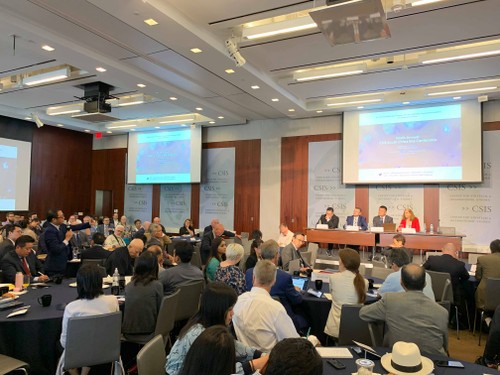 The conference takes place on July 24, 2019, in Washington DC. Photo: Pham Huan. The conference takes place on July 24, 2019, in Washington DC. Photo: Pham Huan. |
The one-day event, held at the Centre for Strategic and International Studies (CSIS) headquarters by the CSIS Southeast Asia Programme and Asia Maritime Transparency Initiative, attracted many experts and scholars from research institutes of the US, Indonesia, the Philippines, Australia, China, Malaysia, and Vietnam. Speaking on the event’s sideline, may scholars agreed that China’s ongoing geological survey work in the East Sea has adversely affected other countries’ legitimate offshore oil and gas exploitation in the East Sea and violated the 1982 UN Convention on the Law of the Sea. Anthony Nelson, Director of the East Asia and Pacific practice at Albright Stonebridge Group, said: “Well Asean needs to make a decision on this issue whether it will continue to let a couple of members that are not particularly even claimers to this issue to veto any important actions or other ASEAN members can join together in a smaller group and try to take more significant actions. The states like Malaysia, Brunei, the Philippines and Vietnam might be able to take a joint effort themselves that would be more effective, probably with the assistance of Indonesia as well, than just anything you get from ASEAN.”
Professor Kavi Chongkittavorn of Institute of Security and International Studies, Chulalongkorn University, said: “ASEAN wants a good COC because it’s not only between China and Vietnam. Because if we get good COC other countries would like to associate with ASEAN and China. In case of a bad one, we’d better not have it and there’s no rush. Now even they agreed on a single draft, there’re still so many issues.”
“Once the US complains, it’s very easy for China to say this is just the US making troubles. If Vietnam, Malaysia, and the Philippines can effectively draw international attention to this issue, it can be a success. The international community paid a lot of attention to China’s actions in 2015 and 2016. The reason the international community stops paying attention in large part was because the Philippines stopped talking about South China Sea. That has to change because it can’t just be the US and Japan or Australia. It has to the European Union, the whole international community to stand up and talk about these issues or the Chinese will feel like they don’t pay any diplomatic costs for this,” said Gregory B. Poling, Director of the Asia Maritime Transparency Initiative.
The conference offered a good chance for experts, scholars and journalists to have deep and multidisciplinary discussions and analysis of developments in the East Sea in recent years, especially recent actions to hinder oil and gas exploitation activities of countries in the sea.